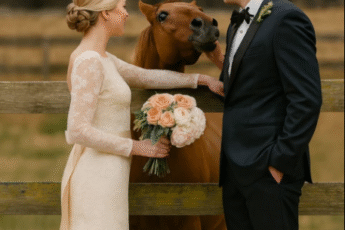My mom and sister hosted the kind of over-the-top children’s party that could have been mistaken for a small-town fair. There were pony rides, a cotton candy cart, and a guest list that included half the PTA. Everyone was invited. Everyone except my daughter. I didn’t yell. I didn’t cause a scene. I didn’t even call to ask why. Instead, I did something else. Three weeks later, my sister was packing boxes and moving out of town, her trendy café permanently closed. And I never even had to raise my voice.
Chapter 1: Not on the List
The irony is, I hadn’t realized we were excluded. Not for a second. Not while helping my daughter, Lena, swirl frosting on her lemon muffins that morning, her small hands surprisingly steady. Not while gently curling her hair as she chattered excitedly about the games and prizes she was sure she would win. Not while she told me, for the tenth time, how much she couldn’t wait to see her cousins.
And certainly not when we pulled into the park and saw a floating rainbow of balloons glinting in the sunlight, or when the bubble machine near the entrance went haywire, sending a soapy galaxy into the sky. I didn’t suspect a thing. If anything, I felt a little guilty for not helping more this year, for not performing my usual role as the family’s unpaid event planner.
Normally, I’d have been there three hours early, arranging the gift table, double-checking the juice box count, and ensuring no one forgot the napkins. But this year, I had stepped back. I told them I couldn’t take charge. For once, I just wanted to attend. To show up as a mom, not a manager.
We walked up the gravel path, Lena’s glittery sandals crunching with each excited step. She clutched her tray of muffins like it was treasure, a small paper tag proudly announcing, Lena’s Lemon Stars. In her seven-year-old mind, that little label guaranteed her belonging.
Then I noticed something new. A check-in table. A bored-looking teenager stood there, clipboard in hand, squinting against the sun like a bouncer at an exclusive club.
“Names?” he asked flatly.
I smiled, still amused. “Joelle and Lena Simmons.”
He flipped a few pages, frowned, then looked back up at me, his expression unreadable. “You’re not on the list.”
I laughed, a light, polite sound. “Oh, that’s okay. I think they just missed us. We’re family. We’re here every year.” I lifted the tray of muffins as proof. “We brought these.”
He didn’t smile. “Sorry. I was told to only let in people on the list.”
My stomach dipped, a cold, unpleasant sensation. “You’re serious?”
He nodded, suddenly uncomfortable but unmoved. “Yeah. Sorry.”
Before I could say more, I heard the crunch of footsteps on the grass behind us—the sound of authority in motion. I didn’t have to look. I knew that walk, those polished shoes, that rehearsed half-smile. Britney. My older sister. The golden one.
She reached the table, gave the teenager an approving pat on the shoulder, and then turned to me with the calm, managerial tone she always used when she was about to humiliate me in a civil way.
“Joelle,” she said, her voice as smooth and sterile as the beige interior of her curated café.
“Britney,” I replied, nodding toward the muffins. “We brought these.”
Her lips curved, but it wasn’t a smile. “Exactly,” she said, her voice dropping slightly. “You weren’t invited.”
I blinked. “What?”
She didn’t soften it. “You’re not on the list,” she repeated, as if confirming a delivery address, not eviscerating her own sister and niece at the entrance to a child’s party. I waited for the laugh, the smirk, the “just kidding.” Nothing came.
“That has to be a mistake,” I said, my voice still even, though my heart had begun to pound. “We’re always invited. We’re family.”
She folded her arms, her expression unyielding. “You said you weren’t involved this year.”
“Yes,” I clarified, my voice rising slightly. “I said I couldn’t organize it. Not that we wouldn’t come.”
She shrugged, that effortless, polished gesture that said everything and nothing at once. “I figured you’d understand.”
My throat went dry. “Understand what, exactly? That we’ve been erased from our own family?”
“Mom?” Lena’s small voice tugged at my hand.
I crouched down, my heart pounding so hard it felt audible. “It’s okay, baby. We’re just figuring something out.”
Then, as if on cue, our mother appeared behind Britney. Sunglasses, pearls, an outfit that screamed “casually expensive.” She didn’t speak, just stood there, a silent, neutral endorsement of the cruelty unfolding.
“Joelle,” Britney said quietly, leaning in as if sharing a secret. “Please don’t make a scene.”
I laughed then, a sharp, cracked sound. “A scene? I’m standing here with a tray of lemon muffins at a children’s party. That’s your definition of a scene?”
“You’re raising your voice,” she warned.
“People are looking.”
Let them look, I thought. Let them see this. But then I felt it—the tremor of Lena’s small hand in mine. Her glittery sandals shifted nervously on the gravel. Her lower lip began to tremble. And then came the moment that will live in my chest forever.
Lena looked up at Britney, her eyes wide and pleading. “Can I please go in? My cousin Ava said there’s a rocket game.”
Britney crouched down, her voice a syrupy, condescending purr. “Not today, sweetheart,” she said, placing a hand on Lena’s shoulder. “It’s not your fault. It’s your mom’s.”
The world went silent. I froze. I took the tray of muffins from Lena’s hands just before it fell. I turned, keeping my movements calm, deliberate. We walked back to the car, the sound of laughter and music from the party growing louder behind us, as if someone had turned up the volume to drown out the sound of a little girl’s heart breaking.
A single, iridescent bubble floated past and popped silently against my arm. Lena said nothing. Neither did I. Halfway home, she finally whispered, her voice a small, wounded thing, “You ruined it, Mommy.”
I couldn’t answer. My throat felt raw, my hands trembling against the steering wheel. When we got home, Lena disappeared into her room, shutting the door gently behind her. I sat at the kitchen table, still holding the tray. The crayon-written label, Lena’s Lemon Stars, was now smudged beyond recognition.
I don’t know how long I sat there, just staring. Eventually, I picked up my phone, searching for a distraction. That’s when I saw it. A notification from an old family group chat, one they had forgotten to remove me from. At the top was a photo, grainy but clear enough. It was me, at the gate, with Lena beside me, clutching the tray. Britney stood in front of us, arms crossed in a posture of defiance. Underneath the photo, a comment from someone I couldn’t even identify: I can’t believe she had the audacity to show up.
The air left my lungs in a painful rush. It wasn’t a mistake. It was a planned, deliberate exclusion. A public shaming. I still didn’t know what crime I had supposedly committed, but I knew, with a certainty that was cold and hard as steel, that I would find out. And when I did, I wouldn’t scream or cry or beg. I would act. Calmly, precisely, and they would never, ever see it coming.
Chapter 2: The Fixer
Some people are bad with money. Some people can’t resist gossip. My fatal flaw? I can’t say no. I’m the family fixer, the reliable one, the human safety net. I’ve said “yes” through tears, through exhaustion, through a resentment so deep it could fill oceans. I’ve said “sure” when I wanted to scream “absolutely not.”
I’m the middle child. Britney, the eldest, is polished and commanding, the kind of woman who speaks in bullet points and runs a trendy, overpriced café where everything is beige and branded. Rachel, the youngest, is the family’s emotional pet, a delicate creature who panics when plans change and has spent her life waiting for someone to fix things for her. That someone has always been me. And then there’s my mother: pearls, perfection, and a selective memory that always manages to position Britney as the hero and me as the help.
Growing up, if Britney forgot a science project, I was the one staying up all night with glue and poster board. If Rachel lost her dance costume, I was the one crafting a new one out of paper bags and glitter. They didn’t say, “Joelle does more.” They said, “Joelle knows how.” And for years, I believed that was a form of love.
Then Lena was born, and I thought motherhood would finally earn me some tenderness. Instead, it just made me more useful. I was the reliable one, the mom who does it all, the one who could be counted on to plan every family event, from baptisms to holiday carnivals.
The breaking point came earlier this year. Another massive family celebration was on the horizon, and I, of course, said yes to planning it before even checking my own schedule. Three weeks into the frantic preparations, I was running down the stairs with a tray of menus when I slipped. I remember the sound—a sickening crack, like a dry twig snapping. I remember Britney standing at the bottom of the stairs, watching me, frozen, not moving an inch to help.
I broke my leg in two places. When I texted the family group chat from the emergency room, the replies came quickly:
Britney: Does the venue still need the final guest list?
Rachel: Do you want me to finalize the playlist?
Mom: Are you sure it’s actually broken?
Not one of them asked, “How are you?” Not one of them asked, “Do you need anything?”
That’s when I started learning a new, foreign language. The language of “no.” I told them I couldn’t finish planning the event. “I need to rest,” I texted. “I can’t do that right now.” The silence that followed felt like power.
So, by the time the annual “Cousin Carnival” rolled around, I was ready. My leg was healing, but my therapist’s words were ringing in my ears: “You need to stop treating rest like a reward you have to earn.” For the first time in my life, I set a real boundary. “I can’t help with the carnival this year,” I told them. “I need to focus on my recovery and my work.”
Britney was livid. Her passive-aggressive texts dripped with disdain about how “some people” couldn’t be counted on anymore. My mother chimed in with guilt-laden comments about how “we all have to make sacrifices.” And yet, I still assumed we were invited. I thought they were just being petty. I never imagined they could be this cruel. I didn’t realize that saying “no” just once would cost me my place in the family. But I was about to find out.
Chapter 3: The Unveiling of the Lie
I didn’t sleep that night. All I could hear was Britney’s condescending voice—It’s not your fault, sweetheart. It’s your mom’s.—and my mother’s silent, damning endorsement. I didn’t understand why.
The next morning, I made coffee with shaking hands and opened the school directory. I found the number for Emily Carrington, one of the other moms whose kids had been at the party. We were friendly. I just called.
She picked up on the second ring. “Joelle,” she said, and her voice, full of pity, told me everything.
“You heard?” I asked.
“Yes,” she said, then a long pause. “Are you okay?”
“No,” I admitted. “Emily, I need you to tell me what people are saying. Please. I just need to know.”
She hesitated, but not for long. “Okay,” she said, her voice dropping. “Britney told everyone that you were supposed to organize the party this year. That you had confirmed everything months ago—the venue, the caterers, all of it.”
“What?” The coffee cup rattled in my hand.
“And then, she said you just… disappeared. Stopped answering texts. Pulled out at the last minute and didn’t tell anyone.”
“That’s a complete lie,” I said, my voice flat.
“I figured it might be,” she said quickly. “But that’s the story. That you bailed the week before. And… she implied that you might have taken the money she gave you for the deposits.”
I couldn’t even speak. I felt like I’d been slapped. “Emily,” I finally managed, “I told them a month in advance that I couldn’t organize it. I have a doctor’s note. I was barely off crutches.”
“I believe you,” she said. “Honestly, the way Britney told it, it always felt a little off. She was so dramatic about it, like she was so worried about you.”
Of course she was, I thought. Lie better. Smile bigger.
I ended the call and immediately dialed Britney. She picked up, her voice syrupy sweet. “Hey, Joelle.”
I didn’t waste time. “You told people I was supposed to organize the party. You told them I took money.”
A beat of silence. “What are you talking about?”
“Emily told me everything, Britney. You said I bailed. You said I stole from you.”
Another pause, then a defensive snap. “Joelle, people misunderstood. I never said you stole anything.”
“Then what did you say?”
“That you had a lot going on! That you weren’t in a place to handle it!”
“I told you a month in advance that I couldn’t do it.”
“You’ve never said no before!” she shot back, the real truth finally slipping out. “I thought you were just stressed! I assumed you’d pull through, like you always do! I didn’t think you were actually going to quit on us!”
“I didn’t quit,” I said, my voice dangerously calm. “I set a boundary. And in response, you lied, you smeared my name, and you humiliated my daughter.”
“I was under pressure!” she cried. “Everything was falling apart, and you just walked away!”
“I had a broken leg, Britney!”
“You were walking just fine!”
I actually laughed, a harsh, humorless sound. “You do realize physical therapy isn’t magic, right? It doesn’t mean I can run a hundred-person carnival.”
“I’m sorry if I hurt your feelings—”
“This isn’t about my feelings!” I cut her off. “This is about you deliberately destroying my reputation to cover for your own incompetence. Did Mom know?”
“She was trying to protect you from the gossip.”
“No,” I said, the final piece clicking into place. “She was protecting you. Like always.”
A long silence, and then she said it, the phrase that had been used to dismiss my feelings my entire life. “You are blowing this way out of proportion. You’ve always taken things so personally.”
I was done. Not just with the conversation, but with all of it. The lies, the manipulation, the years of being their default fixer. She hadn’t just miscommunicated. She had made a choice. When she couldn’t pull off the party on her own, she took my name and set it on fire, and my mother had handed her the matches.
That night, I pulled out an old accordion folder from the back of my closet. Inside were receipts, email threads, and guest lists from every family event I had ever planned. Text messages where I coordinated vendors. Budget spreadsheets in my name. The file from my doctor confirming my fractured leg. And a screenshot of the message I had sent to the family group chat, clearly stating that I could not run this year’s party.
I hadn’t kept these things out of spite. I’d kept them because I’m the kind of person who builds binders for birthday parties. And for the first time in my life, I was glad I did. I was done letting them rewrite the story just because I wasn’t loud enough to stop them.
Chapter 4: The Email That Changed Everything
I didn’t write an emotional manifesto. No dramatic subject line about betrayal or forgiveness. Just facts. Cold, hard, bullet-pointed facts. The subject line read: Clarifying Recent Misunderstandings.
I attached everything. Screenshots of the group chat where I clearly stated I couldn’t organize the party. A PDF of the doctor’s note detailing my injury and recovery timeline. Receipts showing I had already transferred my financial contribution to Britney five weeks in advance. Photos of past planning documents, my name the sole contact for every vendor, year after year.
I CC’d it to the entire extended family mailing list—over a hundred people, including several parents from Lena’s school, a few of her teachers, and, of course, Britney and my mother. Then I hit “send.” I shut my laptop. And I waited.
It took less than fifteen minutes. The first reply was from my cousin David: Jesus Christ, Joelle. I had no idea.
Then a text from an aunt: I am so sorry. I believed her. I am so embarrassed.
Then a message from a parent at Lena’s school: We would love to have Lena over for a playdate. My kids were so upset when they heard what happened at the party.
And it just kept coming. The truth, once unleashed, was a wildfire. People had questions. They wanted to know how Britney thought she could get away with it. Was this a one-time panic move, or had she always been this calculating? A few people even started discussing it on the town’s parent forum, not anonymously, but by name. Joelle didn’t deserve what happened. Her daughter certainly didn’t deserve it. I don’t know how you come back from that as a family.
And that’s when Britney’s curated, beige-colored world started to implode. It didn’t happen all at once. There was no organized boycott of her café, no picketing. Just a quiet, steady emptying out. The usual morning rush of moms with strollers disappeared. The teacher book club that met there on Friday afternoons found a new spot. The Instagram stories tagging her signature cinnamon croissants stopped.
By the second week, she had taken down her “no loitering” sign. By the third, she had stopped posting to social media altogether. By the fourth, I heard from a neighbor that she was trying to sublease the space.
My mother didn’t call until the end of the fifth week. I let it go to voicemail. Her message started with a syrupy, fake concern—“Hi, honey, just wanted to see how you were doing”—and ended with a demand: “This has gone too far, Joelle. You need to fix this before your sister loses everything.”
I didn’t call back. So, she showed up. I opened my door to find her standing on my porch, looking tired but not sorry.
“She’s moving,” my mother said without a hello. “She’s closing the café. She says she can’t stay in this town anymore.”
I said nothing.
“She’s your sister, Joelle.”
Still nothing.
“She made a mistake,” my mother insisted. “But what you did… you humiliated her.”
I raised an eyebrow. “What I did was tell the truth.”
“You could have done it privately!”
“You could have defended me,” I shot back. “But you didn’t. You stood right behind her while she broke my daughter’s heart.”
My mother’s face twitched. “Britney’s not perfect.”
“She lied, Mom. Over and over. And you helped her.”
For a second, I thought she might actually cry. But instead, she pulled herself upright, wrapping herself in a cloak of maternal martyrdom. “She’s leaving town because of you. Are you happy now?”
Happy? No. Not even close. But I wasn’t sad, either. What I felt was… done. Like a heavy, toxic weight had finally been cut loose.
“You always had to make things so difficult,” she said, her voice sharp with resentment.
I gave a dry, humorless smile. “No, Mom. I always made things easy for you. You just never noticed until I stopped.”
I stepped back, a clear dismissal. “Tell Britney I hope she finds what she’s looking for. But I am not fixing this for her.” Then I closed the door. And this time, it felt good.
Later that week, my husband asked if I wanted to help organize the neighborhood’s fall potluck. It was a casual question, but it was loaded. I looked up from my coffee, smiled, and said, “No.”
Just like that. No explanation, no apology, no nervous laugh. Just “no.” And the world didn’t end. The sky didn’t fall. He just blinked, nodded, and said, “Fair enough.”
I think that was the moment I realized I wasn’t scared of being the bad guy anymore. Not if the only other option was to be invisible.
It’s been a year. I don’t talk to my parents. They moved a few months ago to be closer to Britney. What surprised me was my younger sister, Rachel. She showed up one day with coffee and said, “I’ve been thinking… I followed their lead too much. I shouldn’t have.” And we’ve been closer ever since. Life is quieter now. It’s better. But you tell me: did I do the right thing, or did I go too far?






